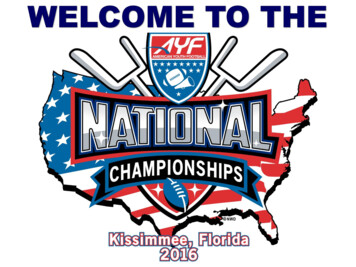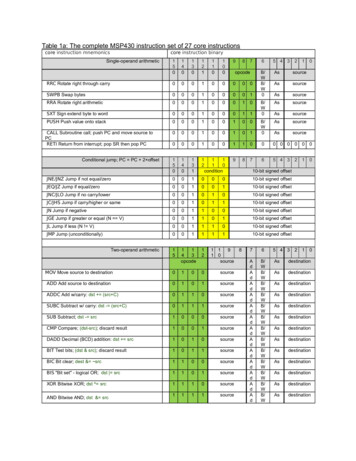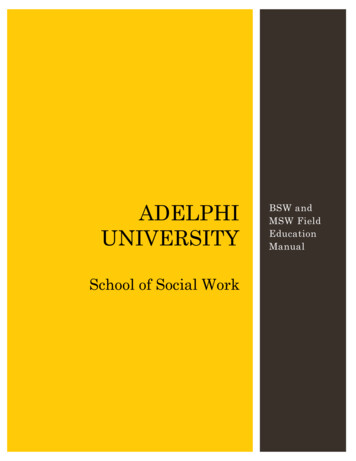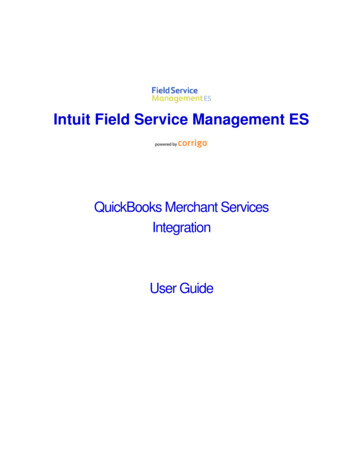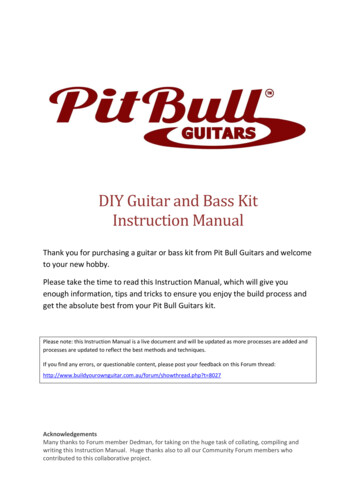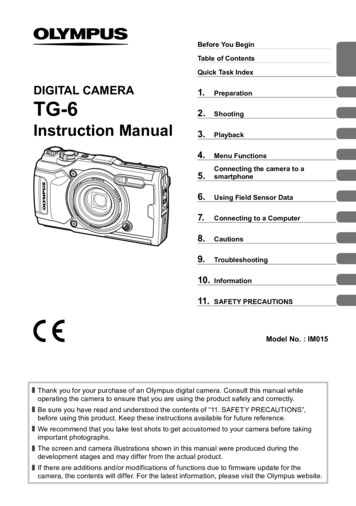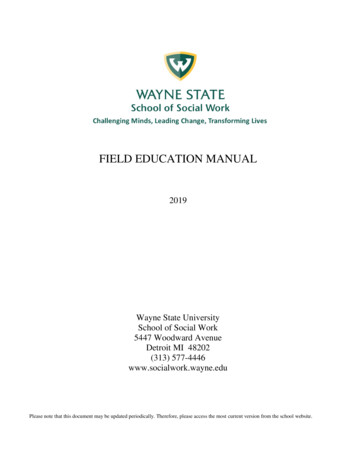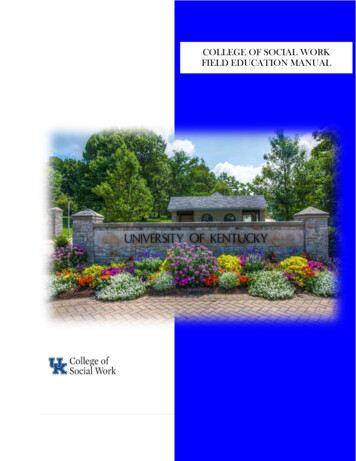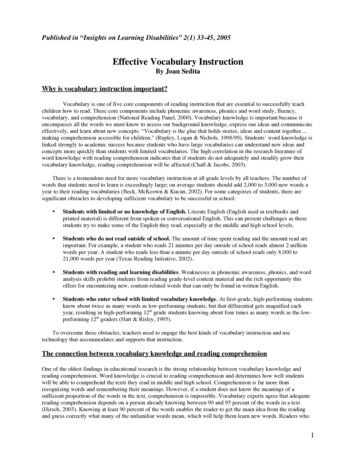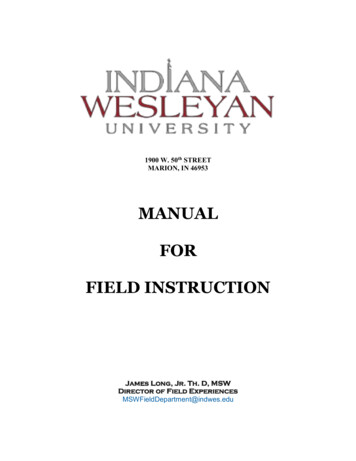
Transcription
1900 W. 50th STREETMARION, IN 46953MANUALFORFIELD INSTRUCTIONJames Long, Jr. Th. D, MSWDirector of Field ExperiencesMSWFieldDepartment@indwes.edu
2021TABLE OF CONTENTSIntroduction . 3Social Work Program. 5EPAS . 7Social Work Curriculum . 8Field Placement. 9Criteria for Selection of Field Practice Settings and Field Instructors . 14Information on Paid Internships per Social Work Field Education . .17Practicum Objectives . 20Time Guidelines and Attendance . 20Responsibilities of the Director of Field Education . 22Responsibilities of Faculty Liaison . 23Eligibility Requirements and Responsibilities of the Student . 25Selection and Responsibilities of the Field Instructor . 29Alternative Field Supervision Arrangements . 32University and Field Placement Partnership . 38Process for Field Instructor Orientation, Training and Communication . 39Monitoring of Student Learning and Performance . 40Evaluation of Field Program Effectiveness . 48Liability Issues, Disability Accommodations and Safety . 48National Association of Social Workers Code of Ethics . 52CSWE Educational Policy and Accreditation Standards . 73References . . 742
INTRODUCTIONThis Field Instruction Manual is written to help MSW students and Field Instructors(Site Supervisors) to understand the IWU MSW Social Work Program and the FieldPracticum component of the program. In this Manual you will find information about theMaster of Social Work program (including Educational Policy and AccreditationStandards), information about the social work profession (including Code of Ethics),information about Field Seminars (SWK-560, 561, 562, 563, 666, 667, 668 and 669), theroles and responsibilities of those involved in Field Experience, and other applicablematerial regarding Field Placement.As stated by the Council on Social Work Education (CSWE), Educational Policyand Assessment Standards (EPAS), “The purpose of the Social Work profession is topromote human and community well-being. Guided by a person-in-environmentframework, a global perspective, respect for human diversity, and knowledge based onscientific inquiry, the purpose of social work is actualized through its quest for social andeconomic justice, the prevention of conditions that limit human rights, the elimination ofpoverty, and the enhancement of the quality of life for all persons, locally and globally”(EPAS, 2015, p. 5). Social work is the professional application of the knowledge of humanbehavior in the social environment and the use of intervention skills in working withindividuals, families, groups, communities, and organizations regarding such problems ofliving in modern society.Social work involves service to all people: from young to old, individuals, families,groups, neighborhoods, and especially the disadvantaged or marginalized in society. Avariety of practice settings are utilized to reach these people, such as hospitals, childcarefacilities, public and private social welfare entities, public schools, home and communitysettings and industries.The Social Work Program at Indiana Wesleyan University offers a Master of SocialWork degree. The Social Work Program, which is accredited by the Council on SocialWork Education (CSWE), is designed to prepare students for advanced social workpractice and provide opportunities for students to become world changers who have adesire to integrate personal faith and learning into their practice to maximize their ability tobe of service to fellow human beings.Social workers improve the quality of life and enhance the client system’s ability tocope with change to improve functioning. Therefore, the basis of learning for social workstudents at Indiana Wesleyan University includes: a holistic view of personsa view of individuals as person(s)-in-situations(s) interacting with, affecting andaffected by others and their environmenta problem-solving / need-resolving / strengths-based approacha systems frameworkan understanding of a Christian worldview and its implications for affectingchange.3
Field Placement Admission CriteriaAs the signature pedagogy of social work education, student readiness for participation in fieldeducation is essential for ensuring success. The IWU MSW program establishes admissioncriteria for both the Generalist and Advanced Practice practicum years to evaluate and ensurereadiness. All required field application and site approval process documents are located inthe Tevera field system. Students will receive an invitation to register for Tevera from theDirector of Field Experiences before applications are due for the generalist or advancedpracticum. More information about Tevera, including tutorials related to the field process canbe found at ter-social-work/teverafield-softwareThe Indiana Wesleyan University MSW Program prides itself on academic excellence.Students in the Social Work Program must complete all required social work courses with aminimum GPA of 3.0 and a minimum grade of a “C” in each course. Also, students must beable to demonstrate qualities of good judgment, the ability to work and communicate well withothers, and the ability to function professionally under pressure. Before approval for fieldplacement, the following criteria must also be met with satisfactory review:Generalist Field Placement Admission Criteria1. Successful completion of prerequisite courses: SWK542 Human Behavior in theSocial Environment, SWK 555 Generalist Practice with Individuals, SWK 543Social Welfare and Policy and SWK 556 Generalist Practice with Families andGroups.2. Completion of the MSW Field Practicum Application3. Submission of a current resume.4. Completion of a Field Placement interview with IWU MSW program Director ofField Experiences as requested.5. Completion of IWU Application for Worksite Field Placement (as needed)6. Approval of student placement site including completed Memorandum ofAgreement (MOA).7. Approval of student Field Instructor after review of completed IWU MSW programfield instructor application8. Completion of Field Liability WaiverAdvanced Practice/Specialty Field Placement Admission Criteria1. Successful completion of prerequisite courses: SWK661 Research Proposal 1,SWK650 Mental Health, and Psychopathology, and SWK655 AdvancedInterpersonal Practice.2. Completion of the MSW Advanced Field Practicum Application3. Submission of current resume4. Confirmation of Field Placement Final Evaluation for Generalist Year and 400Generalist practice hours.4
5. Completion of Field Placement interview with IWU MSW program Director of FieldExperiences as requested.6. Completion of IWU Application for Worksite Field Placement (as needed)7. Approval of student placement site including completed memorandum ofagreement (MOA).8. Approval of student field instructor after review of completed IWU MSW programfield instructor application9. Completion of Field Liability WaiverMSW Program Mission, Vision and Relevant PoliciesThe MSW Program at Indiana Wesleyan University is built on the belief thatsuccessful professional social work education requires the development of qualities basicto both academic excellence and professional success. These include skills incommunication, problem-solving and evaluation, creativity, an understanding of basicfacts and relationships, appreciation for the cultural diversity within society, the ability towork effectively as part of a team, and a freedom of inquiry and exchange within theframework of Christian faith and philosophy.The Mission of the IWU Social Work Program (AS 1.0.1)The mission of the IWU MSW Program is to prepare social work students foradvanced social work practice through an emphasis on clinical skills and assist studentswho desire to integrate personal faith and learning in becoming world changers throughservice to their fellow human beings. The MSW program is committed to training socialworkers who embody a global and person-in-environment perspective, demonstraterespect and humility in responding to diversity in their fellow human beings, valuescientific inquiry and the pursuit of truth, promote individual and societal justice, upholdinherent human rights and seek to address conditions that limit them, and who seek toeliminate poverty and advance the well-being of others. Further, the MSW program seeksto prepare students who uphold and embody and promote core social work valuesincluding service to others, honoring the dignity and worth of all people, acknowledgingthe importance of human relationships, and valuing personal integrity and competence.The program is committed to creating a personal, professional and innovative experiencein the online environment to achieve its mission.MSW Program Goals (AS 1.0.1, 1.0.2, 1.0.3)1. To prepare culturally competent students for advanced level social work practice,including work with individuals, families, groups, organizations, and communities.2. To equip students to integrate social work ethics and personal faith with academicexcellence and research-informed practice.3. To equip students for advanced social work practice and leadership informed bytheoretical perspectives, biblical truth, knowledge of human behavior and research.4. To prepare students to promote individual and community resilience and well-beingthrough respect for racial, ethnic and cultural diversity.5
5. To equip students to advocate for human rights and justice for marginalized andoppressed people.MSW Statement of Program ExpectationsIWU MSW Program students are participating in a program of rigorous graduatelevel study to prepare them for advanced social work practice. To fulfill the demands ofthe program students must meet the following fundamental requirements:- be committed and prepared to take responsibility for their own learning outcomes;- have good oral and written communication skills;- demonstrate effective interpersonal skills;- possess insight and self-awareness;- use effective time management skills, and;- maintain flexibility in scheduling that allows for sufficient time and ability to meetthe demands of their coursework and field work.Students should be prepared to meet these requirements throughout the course ofthe program.Lock-Step Cohort Model Policy and ProceduresStudents in the MSW Program are enrolled into a cohort that has set courses taken in aspecific sequence throughout the curriculum. This “lock-step” model ensures thatstudents take courses with their admission cohort classmates to enhance a learningcommunity experience.Policies Pertaining to the Cohort Model Students requesting to withdraw from a course will be withdrawn from their cohortand rescheduled into another cohort.Students cannot change course sections (i.e. request instructor preference).Instead, students have the choice to withdraw from their courses and berescheduled into another cohort.Students not completing the required paperwork for their field placement by theassigned deadline will be withdrawn from their cohort and from the program andwill need to seek re-entry into the program in another cohort.Students who fail a course will be withdrawn from their cohort and from theprogram. They will need to contact Registration Change in the Office of StudentServices to be rescheduled with another cohort.Any withdrawal as indicated above will result in a delay of graduation.There is no guarantee that a student who withdraws can get back onto the samecohort track (33-month, 24-months, 16-month, Hybrid Cohort) with the next term.Students sitting out one term for any of the above reasons can have their breakcoded as a Scheduled Break – Leave of Absence.6
A break from the program that exceeds 180 days cannot be coded as a ScheduledBreak – Leave of Absence.Students receiving an incomplete grade can continue in the program. Failure tomake a passing grade for the incomplete by the designated deadline will result inwithdrawal from the program and rescheduling with another cohort.The social work courses and required supporting courses in the program haveevolved from a constellation of expected educational outcomes and professionalcompetencies, consistent with advanced social work practice. The courses includecontent on values, knowledge, skill and cognitive and affective components in an attemptto assist each student to:1.2.3.4.Clarify personal and professional values.Develop a core of knowledge in social, behavioral sciences and supportivedisciplines and the ability to apply a generalist and advanced practice model ofsocial work to various client populations.Enhance communication skills on many levels.Develop a commitment to work toward social, environmental and economic justicewithin the context of professional social work practice.During the field experience, as students practice the knowledge, values, skills andcognitive and affective processes they acquire through the MSW program, the social workfaculty, with the assistance of student and agency feedback, will continually evaluate thesocial work curriculum, its content, and its instructional methods. The social work facultywelcome the suggestions of agency personnel and students alike as they seek tostrengthen and improve the program.EPAS 2015 Social Work Program Competencies (M2.0.1, M2.0.2)Core competencies and field education (signature pedagogy) are the key elementsof the explicit curriculum at IWU. Competency-based education is an outcomeperformance approach to curriculum design. Competencies are measurable practicebehaviors that are comprised of knowledge, values, skills and cognitive and affectiveprocesses. The goal of the outcome approach, according to CSWE, is to demonstratethese competencies in the integration and application of knowledge, values, and skills inpractice with individuals, families, groups, organizations, and communities in apurposeful, intentional, and professional manner to promote human and community wellbeing (EPAS, 2015).The explicit curriculum at the MSW level is designed to prepare its graduates forgeneralist and advanced practice with an emphasis in clinical skills through mastery of thecore competencies as operationalized by the behaviors that characterize each. Theprogram’s competencies are operationalized in the explicit curriculum and programassessment through measurable practice behaviors.7
Upon completion of the MSW Social Work Program at Indiana WesleyanUniversity, students will achieve competencies within the framework of the generalist andadvanced level of social work practice. (M2.2.1, M2.2.2) In the field education program, allCSWE nine core competency areas are built into the student’s learning agreement, fieldevaluation, and portfolio requirements, to ensure that each competency is connected topractice opportunities with individuals, families, groups, organizations, and communities.Learning agreements specific to the generalist and advanced practice year are designedto require that the student, in conjunction with the field instructor and faculty liaison,identify learning activities that are outcome based and result in demonstration or evidenceof learning in each area. Competency areas included are as follows:Educational Policy and Accreditation Standards (EPAS) – Core CompetenciesCompetency 1Demonstrate Ethical and Professional BehaviorCompetency 2Engage Diversity and Difference in PracticeCompetency 3Advance Human Rights and Social, Economic, andEnvironmental JusticeCompetency 4Engage in Practice-informed Research and Researchinformed PracticeCompetency 5Engage in Policy PracticeCompetency 6Engage with Individuals, Families, Groups, Organizations,and CommunitiesCompetency 7Assess Individuals, Families, Groups, Organizations, andCommunitiesCompetency 8Intervene with Individuals, Families, Groups, Organizations,and CommunitiesCompetency 9Evaluate Practice with Individuals, Families, Groups,Organizations, and CommunitiesSocial Work CurriculumThe following example of the course sequencing in the MSW program indicatesrequired social work courses. Field courses are in red.Standard 33 MonthProgramStandard 24 MonthProgramAdvanced Standing 16Month Program8
SWK 542SWK 542 & SWK 555SWK 650SWK 555SWK 543 & SWK 556SWK 655SWK 543 & SWK 556SWK 560SWK 661 & SWK 656SOC 582 & SWK 557SWK 561 & SWK 557SWK 662 & SWK 660SWK 560SWK 582 & SWK 562SWK 666SWK 561SWK 563SWK 667SWK 562SWK 650SWK 668SWK 563SWK 655 & SWK 660SWK 669SWK 650SWK 666SWK 655SWK 667 & SWK 656SWK 651 and 656SWK 668 & SWK 661SWK 662 & SWK 660SWK 669 & SWK 662SWK 666SWK 667SWK 668SWK 669Hybrid Cohort – Advanced StandingFall SemesterSpring SemesterSWK 661SWK 662SWK 655SWK 656SWK 660 - PolicySWK 666SWK 650SWK 667Summer SemesterSWK 668SWK 6699
Hybrid Cohort – Standard TrackFall 1 SemesterSpring 1 SemesterSWK 542SOC 582SWK 560SWK 561SWK 543SWK 557SWK 555SWK 556Fall 2 SemesterSummer 1 SemesterSWK 562SWK 563Spring 2 SemesterSWK 661SWK 662SWK 665SWK 656SWK 660SWK 666SWK 650SWK 667Summer 2 SemesterSWK 668SWK 669Field PracticumPracticum ObjectivesField instruction is an educationally directed and supervised planned learningexperience that gives students the opportunity to apply and refine values and skills andapply theories learned in the Human Behavior and Social Environment, Social WelfarePolicy and Services, Social Research, and Social Work Practice courses. The fieldcomponent, with particular reference to the field practicum, is the key integrativecomponent towards which all other sequenced learning is directed and from whichclassroom learning is assessed and refined. To achieve this integration of classroomlearning and practice, field practicum objectives include the following: (M2.2.2, M2.2.3, AS2.2.1, AS 2.2.4)1. To provide the student with the opportunity to demonstrate competencies and tolearn by “doing.”2. To assume professional social work practice roles in providing direct and indirectservices to individuals, families, groups, organizations, and communities at thegeneralist and advanced level. (M2.2.2, M2.2.3)3. To provide the student with the opportunity to correlate and integrate thetheoretical and conceptual components of classroom learning with actual practice.(AS 2.2.1)10
4. To provide the student with the opportunity to test out, apply, and refine concepts,principles, theories, and values taught in the classroom. (AS 2.2.1)5. To provide the student with the opportunity to learn additional or specializedknowledge, skills, insights, and tools for effective social work practice. (M2.2.3)6. To provide the student with the opportunity to receive direct observation, feedbackand guidance from experienced social work staff on his or her practice behaviors,values, and skills to develop competence as a professional social worker. (M2.2.4)MSW students complete Field Placement experiences in conjunction with SocialWork core coursework for both the standard and advanced standing tracks. Studentsspend approximately 12 hours a week in the field setting during the generalist year/ first year practicum (15 for Hybrid cohort) and approximately 16 hours per week inthe advanced year / 2nd year practicum (18 for Hybrid cohort). Standard trackstudents must complete 900 field education hours over the course of their MSW program,400 hours in the generalist practicum year and 500 hours in the advanced practice year.Advanced standing track students must complete 500 hours during the course of theirfield practicum. Both generalist year and advanced practice year practicums arecompleted in one agency over a 32-week period (28-weeks for Hybrid Cohort). (AS 2.2.5)Field Practicum OverviewYearRequired FieldHoursAverage hoursper weekLength ofPracticum(practicumsare at oneagency)Seminars takensequentiallyduring thepracticumGeneralistPractice(Year 1)4001232 weeks15 for HybridCohortAdvancedPractice(Year 2)50028 weeksfor HybridCohort32 weeksSWK 560SWK 561SWK 562SWK 563AdvancedStandingStudents5001618 for HybridCohort28 weeksfor HybridCohort1632 weeks18 for HybridCohort28 weeksfor HybridCohortSWK 666SWK 667SWK 668SWK 669SWK 666SWK 667SWK 668SWK 66911
Field education is an integral component of social work education and is anchoredin the mission, goals, and educational level of the program. It occurs in settings thatreinforce students’ identification with the purposes, values, and ethics of the profession;fosters the integration of empirical and practice-based knowledge, and promotes thedevelopment of professional competence. Field education is systematically designed,supervised, coordinated, and evaluated by criteria by which students demonstrate theirachievement of program objectives and practice behaviors. These criteria will be outlinedin the students’ learning contracts, which are created in the first few weeks of the FieldPracticum.Goal-directed education, with specifically designed curriculum content andoutcomes to connect the field education program with the theoretical and conceptualcontributions of the classroom, has been developed to facilitate conceptualization andstimulation of the learning process. (AS 2.2.2, M2.2.1) To achieve the desired results ofthis goal-directed education approach, it is necessary to depart from the traditional tutorialand apprenticeship models of field instruction and move to hands-on practice. Placementexperiences allow students to encounter a variety of delivery systems as well as modelsand methods for delivery. The student is given the opportunity to conceptualize the“whole” person-in-situation; thus, the student will be looking at not only individuals orfamilies but also agency policies, the larger social welfare systems, and social workpractice as a possible focus of change. The intent of the field seminar classes and fieldexperiences is to develop social work practitioners who are capable of advanced socialwork practice with an emphasis on clinical skills.Signature Pedagogy: Field EducationSignature pedagogy represents the central form of instruction and learning inwhich a profession socializes its students to perform the role of practitioner.Professionals have pedagogical norms with which they connect and integrate theory andpractice. In social work, the signature pedagogy is field education. The intent of fieldeducation is to connect the theoretical and conceptual contribution of the classroom withthe practical world of the practice setting. It is a basic precept of social work educationthat the two interrelated components – classroom and field – are of equal importancewithin the curriculum, and each contributes to the development of the requisitecompetencies of professional practice. Field education is systematically designed,supervised, coordinated, and evaluated based on criteria by which students demonstratethe achievement of program competencies. As described in this manual, field tasks andassignments are also required for completion by students that are specifically designed toconnect theory to practice. These include the student learning agreement, structuredrecordings of supervision, process recordings and the field work portfolio. Each of theseactivities is tailored to support learning and integration of Generalist PracticeOpportunities for demonstrating social work competencies with individuals, families,groups, organizations, and communities or (M2.2.2) Advanced Practice Opportunities fordemonstrating social work competencies with individuals, families, groups, organizationsand communities based on the student’s practicum year.12
Through the field placement, students’ experiences will be sought and growth willbe evaluated in the following areas, as they apply to systems of all sizes:1.2.3.4.5.Knowledge and Understanding of Placement AgencySocial Work Values and EthicsProfessional Learning and DevelopmentA. Work PerformanceB. Professional GrowthC. SupervisionSocial Work Skills and ProcessA. CommunicationB. Assessment SkillsC. Selection of Intervention PlanD. Implementation of Intervention PlanE. Termination and EvaluationSocial Systems and ResourcesArticulated Learning Model (AS 2.2, M2.2.1)Indiana Wesleyan University strives to create an experiential learning environmentwithin the field practicum experience by utilizing an articulated learning approach asdescribed by Sheafor and Jenkins (1982) (as cited by Moen, Liley-Goodrich, & Dennis,2016 (p. 138). This approach promotes a collaborative model for field education bydeveloping a partnership between the field instructor and university faculty liaison inhelping students to integrate theory and practice. Also, this model seeks to continuallyinform the curriculum and integrate themes encountered in the field setting into the fieldseminar. The goal as described by Moen, Goodrich-Liley and Dennis (2016) is a“synergistic exchange among student, field instructor and field liaison” as the placementunfolds (p. 139). It is understood in this approach that the agency field instructor and theUniversity faculty make up a teaching team, jointly sharing the responsibility fordeveloping learning opportunities in various placements and individualizing the learningexperiences to meet student needs.When students enter the IWU Social Work Program, they come with certaineducational expectations. Among these are the anticipation of acquiring a body ofknowledge and appropriate practice skills from instructors who can transmit these in aclimate conducive to learning. Such learning takes place both in the classroom andduring field placement in the agency setting.Students also come into the program with various degrees of personal maturity, lifeexperiences, and individual learning styles. All of these factors play a part in eachstudent’s learning and progress toward competence. In light of this, students are requiredto show that they have addressed any growth areas that may have been identified in astudent performance plan during the course of the program. Both professional andpersonal qualities are assessed during the field curriculum to ensure that studentspossess the desired qualities of professional social workers.13
Field Seminars and Practicum Sites for Students in Family and Close InterpersonalRelationshipsTo ensure a positive learning experience and minimize conflicts of interest during the fieldseminar and practicum experience, students completing the MSW program in the sametrack and time frame as a spouse, partner or closely related family member or significantother (child, sibling, household member, etc.) will be separated into different fieldseminars and may not complete practicums at the same agency.Review of Student Performance (M2.2.6)Student academic and professional performance are reviewed throughout the IWUMSW program. Academic and professional performance is evaluated in social workcourses including field courses with criteria for evaluation being outlined in course syllabi.The initial review of professional capacity and performance occurs through the applicationand approval for acceptance to the MSW program. Students are subsequently evaluatedfor overall professional readiness through the Social Work Field Education applicationand interview process. The Field Application process is initiated by the Director of FieldExperiences approximately three months before the field practicum begins. Successfulcompletion of the Field Application process gives the student permission to continue intothe field practicum for both the Generalist and Advanced Practicum years, acknowledginghis or her professional readiness. Students must also demonstrate professionalcompetency in the field experience to graduate with the MSW degree. This includessuccessfully passing the Mid-term and final field evaluations as well as two professionalbehavior reviews completed by the Field Instructor. Competency is measured in all nineCSWE areas by the final field evaluation and the final portfolio completed as part of theField Education Seminars for each practicum year.Criteria for Selection of Field-Practice SettingsField Practice settings for MSW students can include a variety of public and privateagencies serving many different client populations. Planning for student placementsinvolves both the MSW student and the Director of Field Experiences. As part of the FieldApplication, students are asked to provide the Director of Field Experiences with at leastthree (3) potential sites that they have identified that offer social work services in theirarea and serve a population of interest. Students are responsible for contacting theiridentified agencies to inquire as to whether they accept students at the Master’s level forpracticu
As th e signature pedagogy of social work education, student readiness for participation in field education is essential for ensuring success. The IWU MSW program establishes admission criteria for both
